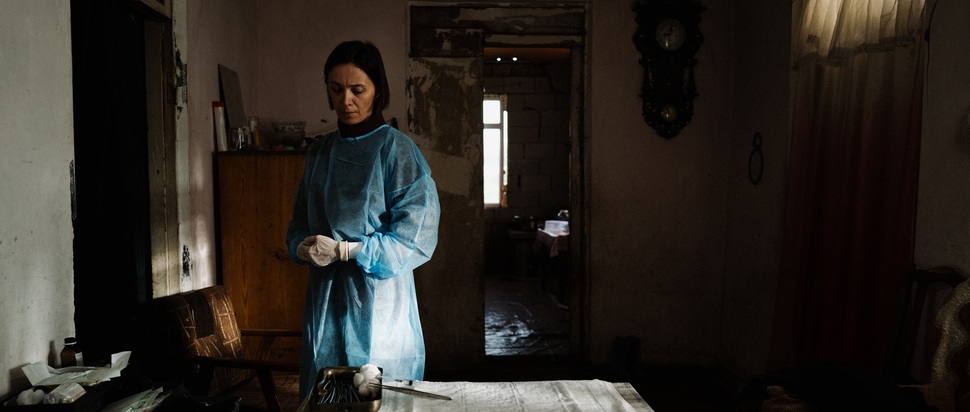Déa Kulumbegashvili on abortion drama April
Georgian filmmaker Déa Kulumbegashvili talks to us about the making of her abortion drama April and the role of cinema in the face of repressive systems
Like the home abortions carried out by its protagonist Nina, the making of April was shrouded in secrecy for writer-director Déa Kulumbegashvili. Flying under the radar isn’t easy when you’re “constantly followed by police”, she tells us ahead of her film’s UK release.
After her debut Beginning made waves during the pandemic, the Georgian filmmaker returned to her hometown, Lagodekhi, for her sophomore feature, which follows an obstetrician-gynecologist moonlighting as an abortionist. Terminating an unplanned pregnancy is legal in Georgia, but restrictions and stigma, particularly in more rural areas like Lagodekhi, hinder safe access to the procedure – hence the need for Kulumbegashvili's secrecy. “They knew I was making a film about a female doctor. But we could not say what it was really about,” she explains.
Shadowing local OB-GYNs for a year, Kulumbegashvili witnessed some incidents that shifted her perception of the filmmaker’s role. “As a young director, you have this feeling that you just have to tell a story,” she explains. “And then, I went to this hospital and met these doctors and started to see things… it was a very humbling experience. I learned that maybe making films is not a way to intervene, but to provide a glimpse of a way out.”
Co-produced by Luca Guadagnino, April reunites Kulumbegashvili with her Beginning star Ia Sukhitashvili. “Ia was mostly with me [during research] and it was a tremendous commitment [for her]," the director says. After playing Yana in Beginning, Sukhitashvili gives another disquieting performance as Nina, a haunted doctor fighting a system that’s waging war on women’s bodies.
Since its latest elections in December 2024, Georgia has been eyeing even more draconian limitations on reproductive freedom. “They're discussing not allowing IVF for single women,” Kulumbegashvili tells me. “Basically, you can only get pregnant with the agreement of your legal husband. And they're discussing even further restricting abortions.”
This hostile, shame-ridden atmosphere lies heavy on the women of April. Not just Nina, but her patients too – a child spouse forced to hide her contraception and a deaf-mute woman dealing with an unwanted pregnancy. Defiantly, the film features a graphic birth scene, a C-section and an abortion, all focusing on the anatomy of the female body with refreshing neutrality. "I don't want to bring any extra beauty to these female stories,” Kulumbegashvili says. “I want to be able to convey our experiences just the way they are. Even when we were filming the birth, there was this [question], ‘How do you beautifully frame [it]?’ I don't want to beautifully frame births. It’s all-encompassing.
"There are all these questions, which mostly are asked by men, when it comes to female characters,” she adds. “And I want those questions to be asked by women.”
Her next film, produced by Emma Stone, will be about "women and children, again” and set in the US — another country rife with patriarchal politics. The upcoming project, which Kulumbegashvili is currently writing, marks her first outside her homeland. “I understand that there are certain films I cannot dare make [in Georgia]. And that's very terrifying for me, this idea that I just can't do it because I know that I would endanger so many people.”
For someone who believes “dialogue is a big part of the soundscape,” the switch to English will open new possibilities. "I'm fascinated to be able to work with really incredible actors. I love actors in general, so English just gives me so much more [scope],” Kulumbegashvili said, sharing her hopes for some Georgian stars to join her in this American production too.
“I really hope that I will never lose Georgia,” she adds, reflecting on turning the camera away from familiar places. “This country has lived through horrible dictatorships. It lived through the Soviet Union, it lived through the purges in the 1930s. The best part of this country was killed [back then].”
The director sees cinema as “an unresolved relationship,” much like the one she maintains with her hometown. Looking back on growing up in rural Georgia during the Civil War, she shares bittersweet anecdotes of walking to school in the freezing cold with her sister, both in awe of the country's breathtaking nature. “It was not an easy childhood, but it was a beautiful one,” she says. “And it gave me all the people who made me who I am and who I'm very grateful for."
Those human relationships shaped her as a filmmaker, though her village didn’t have a cinema – and still doesn’t to this day. “The children and most of the women who star in my films have never been in a cinema,” she explains. “And I hope we can have a small one. I want cinema to be not just about telling stories, but also giving hope or an example to somebody in the audience, and tell them they’re not alone and that we can connect somehow.”
Released 25 Apr by BFI; certificate TBC
